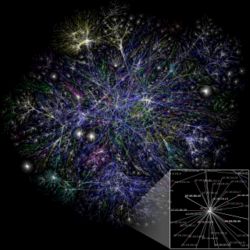Internet: Difference between revisions
imported>Eric M Gearhart (added some more content. there's so much to do withh this article) |
imported>Eric M Gearhart (Added paragraph at the bottom of the intro giving readers more insight into the Internet's impact on society) |
||
| Line 1: | Line 1: | ||
[[Image:Internet map 1024.jpg|right|thumb|250px|A map graphically displaying interconnections on the Internet (known as [[Router|routes]])]] | [[Image:Internet map 1024.jpg|right|thumb|250px|A map graphically displaying interconnections on the Internet (known as [[Router|routes]])]] | ||
The '''Internet''' is a network of [[computer network| | The '''Internet''' is a "network of [[computer network|networks]]" best known as the global network the [[World Wide Web]] is run on. Many people mistakenly call the "World Wide Web" "the Internet," however this is not actually the case. The Web is the Internet's best known and front-facing service, however there are literally hundreds of different [[protocols]], applications and services that run over the Internet. | ||
The research which led to the | The research which led to the Internet was funded initially by the United States' [[Defense Advanced Research Projects Agency]] (DARPA), which was established in 1958 as the first U.S. response to the Soviet launching of [[Sputnik]]<ref name="DARPA1">{{cite web|url=http://www.darpa.mil/body/overtheyears.html|title=Defense Advanced Research Projects Agency|publisher=United States government|year=2003|accessdate=2007-05-12}}</ref>. The first functional networks between individual computers were created in the early 1970s. Many educational institutions and corporations began joining the network, and in 1983 all nodes on the so-called DARPA-net changed over at once to a new [[protocol]], TCP/IP, which is still in use on the internet today. The fundamental transport [[protocol]] for the internet has not changed substantially in more than twenty years. However, it is on the verge of being "upgraded" in the near future, with a movement from version 4 (IPv4) to version 6 (IPv6) of TCP/IP. | ||
The "disruptive technology" and popularity of the Internet has precipitated a paradigm shift in global mass communication much the same as earlier technologies such as the [[Telephone]] and American [[Bell system]] did, as people around the world can communicate seamlessly over vast distances via many different means. Because of technologies like the Internet, it is said that everyone lives as neighbors in the "global village." | |||
==History== | ==History== | ||
Revision as of 15:13, 14 May 2007

The Internet is a "network of networks" best known as the global network the World Wide Web is run on. Many people mistakenly call the "World Wide Web" "the Internet," however this is not actually the case. The Web is the Internet's best known and front-facing service, however there are literally hundreds of different protocols, applications and services that run over the Internet.
The research which led to the Internet was funded initially by the United States' Defense Advanced Research Projects Agency (DARPA), which was established in 1958 as the first U.S. response to the Soviet launching of Sputnik[1]. The first functional networks between individual computers were created in the early 1970s. Many educational institutions and corporations began joining the network, and in 1983 all nodes on the so-called DARPA-net changed over at once to a new protocol, TCP/IP, which is still in use on the internet today. The fundamental transport protocol for the internet has not changed substantially in more than twenty years. However, it is on the verge of being "upgraded" in the near future, with a movement from version 4 (IPv4) to version 6 (IPv6) of TCP/IP.
The "disruptive technology" and popularity of the Internet has precipitated a paradigm shift in global mass communication much the same as earlier technologies such as the Telephone and American Bell system did, as people around the world can communicate seamlessly over vast distances via many different means. Because of technologies like the Internet, it is said that everyone lives as neighbors in the "global village."
History
1950s to 1970s
1975 to 1980
1980 to 1990
Impact on Society
External Links
- "History of the Internet" sites abound in various places on the Internet, as seen by this Google search
Related Topics
- The ARPANET was the Advanced Research Projects Agency network that evolved into today's Internet
- The article on Computer networks for a general overview of computer networking
- ↑ Defense Advanced Research Projects Agency. United States government (2003). Retrieved on 2007-05-12.